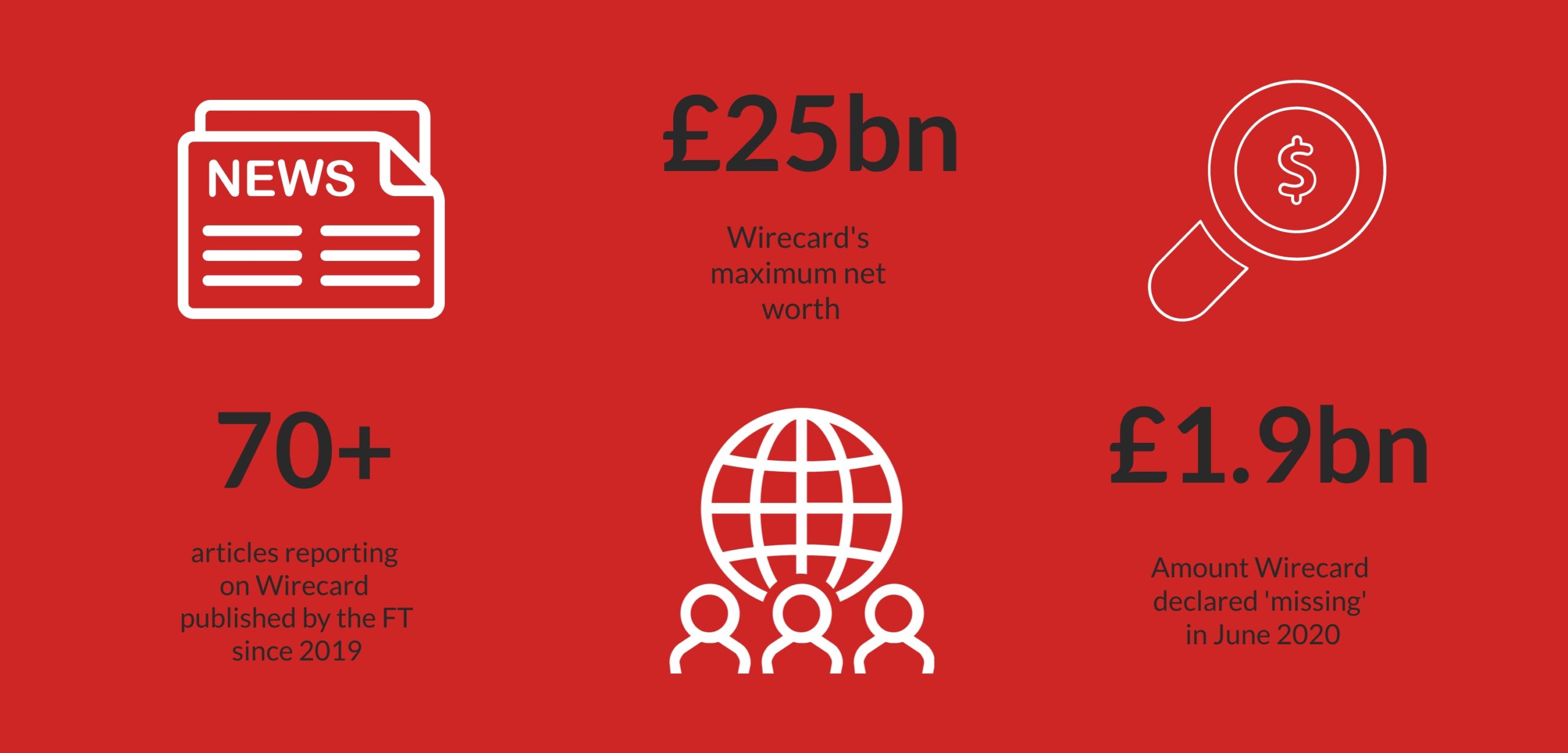
Web Summit/ Creative Commons
Nicola Blackburn speaks to the investigations editor at the Financial Times, Paul Murphy, about the Wirecard affair.
A poster looms on the wall behind Paul Murphy. A man is pictured in two side-by-side images, bearded in one, clean-shaven in the other and smirking in both. “Fraud in the billions”, the headline exclaims. And below, in smaller print: “Can you provide any information on Jan MARSALEK’s whereabouts?”
As a former chief operating officer of the now-insolvent German financial services provider Wirecard, Marsalek is one of Interpol’s most “wanted” persons in the world. Until last August, Wirecard was a DAX 30 listed financial services provider pioneering the transition to a cashless economy. But after years of mounting suspicion and a criminal investigation by German prosecutors, Wirecard filed for insolvency in June 2020, claiming €1.9bn (£1.7bn) was “missing” from its accounts. It has since been accused of over a decade’s worth of fraudulent accounting.
Wirecard – and what is allegedly one of the largest fraudulent operations in post-war European history – has been the focus of Murphy’s journalism for the past three years. “It’s unlike any story I’ve ever worked on before,” says Murphy. The Wirecard “story” amounts to over 70 articles published by the FT investigation team since the start of 2019. They report on Wirecard’s dubious accounts, business links and audits – and their work is soon to be the focus of a Netflix documentary, too. One year on from the insolvency, the Financial Times’ (FT) investigations editor is reflecting on what can be learned from the scandal for future investigations into the financial world.
“In the case of Wirecard, the decision to publish an internal spreadsheet on October 15, 2019 – that killed the company”
The investigations team’s reporting sometimes involved the publication of Wirecard’s internal documents, an action that enervated the FT’s legal team – and Wirecard. “I argued that we just had to do it,” says Murphy, “because otherwise people can just dismiss our work. In the case of Wirecard, the decision to publish an internal spreadsheet on October 15, 2019 – that killed the company.” The spreadsheet in question, exposed by investigative reporter Dan McCrum, detailed Wirecard’s non-existent transactions.
By this point, FT reporters working on the story had been the target of “black ops”. McCrum’s email conversations appeared mysteriously on the internet whilst Wirecard loyalists attacked him on Twitter. “FT: Fire the liar!”, read one. “Are you celebrating your next birthday in jail?”, said another.
Murphy is “still trying to tease apart” the extent of surveillance operations against FT reporters over those years, though he knows that one operation, which targeted investors and hedge fund managers said to be colluding with the FT, involved 28 private investigators. Another 2016 operation by an unnamed European investigation company targeted McCrum, aiming to hack his phone and track its location 2-3 times a day.

McCrum wrote in his 2020 long-read on the Wirecard affair that Marsalek admitted his link to spying operations against the FT – and that he’d personally seen Murphy’s bank records. Marsalek’s June 2020 disappearance has meant that these allegations cannot be confirmed or denied. “We’d seen nothing like it, certainly not on that level,” Murphy says of the “black ops”. “It made us even more suspicious about the company.”
Murphy’s team remained a target. He watched as BaFin, the German financial services regulator, launched a criminal investigation against FT reporters McCrum and Stefania Palma in 2019. The suspicion – that the journalists’ critical articles deliberately depressed the share price of Wirecard and amounted to market manipulation – had been Wirecard’s claim. For Murphy, the probing was more “bewildering” than alarming. “I’ve been working with Dan McCrum very closely for a number of years,” he says. “I knew he was not a criminal. I knew Stefania was not involved in some sort of market manipulation scheme. It was ludicrous to us.”
Wirecard’s aggressive response to the FT’s reporting may have been “on another scale”, but the victimization of investigative journalists has been prevalent for some time. In fact, the harassment of journalists, particularly online, is widespread: a survey by the NUJ in November revealed more than half of journalists had experienced online abuse in the previous year.
“It’s not illegal here to spy on people. In an era of a need for much greater privacy online, maybe we should demand that offline as well”
The Government’s publication of a National Action Plan for the Safety of Journalists proposes to improve the criminal justice system’s response to crimes against journalists, and work with social media platforms to crack down on online abuse against them. When it comes to in-person surveillance, Murphy thinks legal action is required, too. “It’s not illegal here to spy on people,” he says. “In an era of a need for much greater privacy online, maybe we should demand that offline as well.”
Wirecard’s alleged crime of financial fraud is becoming more common, too. The rise of fintech, coupled with the internationalization of capital, has created a global economic environment ripe for fraud. PwC’s Global Economic Crime and Fraud Survey revealed that almost half of over 5000 surveyed companies had experienced financial fraud at least once in 2020, whilst only 56 per cent of organizations conducted an investigation into their worst fraud incident.
The pandemic has further facilitated fraudsters by disrupting financial companies’ usual business processes and security – with many employees no longer working on office devices. The widespread use of digital payment apps in Britain has made the country a hotbed of financial and corporate scams, with the FT reporting that over £400m is lost to “push-payment” scams each year.
“There’s so much money that’s being pumped into the system globally. Markets have gone nuts. There’s so much nonsense out there”
It’s not the first time Murphy has seen a boom in accounting scandals. “I’m old enough to have watched the kind of wreckage after the dot com bubble,” he says. In 2002 alone, stock market giant WorldCom inflated its assets by as much as $11bn (£7.9bn), stock market giant Tyco inflated its income by $500m (£359m) and its CEO and CFO stole $150m (£108m). “You read back through economic history and this happens with every single major cycle,” Murphy adds.
To financial regulators and journalists, the FT’s Wirecard work signposted the urgent need for more investigations into today’s financial world. Murphy sees the FT moving towards more “deep, serious” journalism as inevitable – yet investigations are still relatively new territory. Unlike some of its Fleet Street counterparts, the broadsheet does not have a long investigative tradition – the position of investigations editor had been dormant for three years when Murphy was installed in 2018.
“It was a massive fraud sitting there in plain sight, very obviously, for more than a decade”
Now his team is “actually finding it quite difficult to decide what to look at”, he says. “There’s so much money that’s being pumped into the system globally. Markets have gone nuts. There’s so much nonsense out there.”
When it comes to investigating financial fraud, Murphy’s take-home message for journalists is simple: go with your gut. For Murphy, Wirecard’s red flags – never competing for new business pitches according to Murphy, its accounts not adding up, the abundance of negative reviews on consumer review site Trustpilot – were always apparent. “With Wirecard, all anybody had to do was stop and look at it”, he says. “It was a massive fraud sitting there in plain sight, very obviously, for more than a decade.”


















